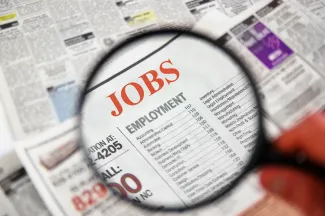
Conflict as Nebraska Legislature advances changes to voter-approved minimum wage increases
Following a lengthy and contentious debate, the Nebraska Legislature Tuesday advanced an effort to weaken and add exceptions to the minimum wage increase Nebraska voters approved by ballot measure in 2022.
In a 32-17 vote, state legislators pushed onto the next stage of lawmaking an amended Legislative Bill 258championed by businesswoman and State Senator Jane Raybould of Lincoln.

At times, the debate got personal, with colleagues on the left pointing barbs at Raybould.
Raybould’s family owns B&R Stores, which owns Russ’s Market, Super Saver and more in the state. Her last day as company vice president was Monday, the same day debate began on her bill. She had filed a conflict of interest statement after introducing LB 258, her 2025 priority bill, earlier this year.
“When my colleagues want to beat up on me, please do, I can take it,” Raybould said during debate. “I am proud of my work and service to my community and my state over these years, and I will stand up for a balanced approach to creating good policy that keeps our Nebraska families safe, healthy and, most importantly, employed with benefits and competitive wages.”
The coalition behind the successful 2022 campaign said Raybould’s bill could lead to Nebraska wages falling behind increasing costs of living.
“We are very discouraged by the Nebraska Legislature, once again, standing in direct opposition to the will of the majority of Nebraska voters,” the Raise the Wage Nebraska coalition said in a statement.
‘I want the accountability’
Rough waters may be ahead, though, for the effort as 33 votes are needed to get the bill over the finish line. Freshman State Senator Stan Clouse, the former Kearney mayor, voted to cease debate but against advancing the bill. Raybould would need his vote, or another, for her bill to pass. Amending voter-approved laws requires at least 33 votes.
Raybould said after the vote that she was not worried and already was working on a way to cinch the necessary support. She said she felt attacked and had never heard colleague State Senator Danielle Conrad, a fellow Lincoln Democrat, “beat up anybody as badly as she said terrible things about me.”
I want the accountability. I want the record to show who you are.
– State Senator Danielle Conrad of Lincoln
The current Legislature’s most veteran lawmaker, with 11 years in the post, Conrad said she stood up for the will of the voters and did not view young workers as “subhuman” subject to subminimum wages.
Among Raybould’s proposed changes is the creation of a new and lesser minimum wage for youths ages 14 and 15. Federal law sets many restrictions on these youth workers, such as requiring non-hazardous or non-manufacturing jobs and prohibitions on duties the workers can perform.
“When’s it enough?” asked Conrad of voter support. Of 49 legislative districts, a majority of voters in 38 districts supported the ballot language Raybould’s bill would change. Raybould’s constituents were the fifth highest in support.
“I want the accountability,” Conrad said. “I want the record to show who you are.”
Proposed changes
The ballot initiative voters handily approved in 2022 gradually increased the minimum wage by $1.50 a year until it reaches $15 an hour by January 1, 2026. The minimum wage after that is to adjust annually based on the Consumer Price Index to account for cost of living increases.
Raybould’s amended LB 258 instead would:
- Increase the minimum wage annually by up to 1.5 percent, beginning in January 2027, based on the Midwest CPI.
- For youth workers ages 14 and 15, a $13.50 minimum wage would increase by 1.5 percent in January 2030 and every fifth year after. Emancipated minors are excluded. There is no such provision in state law currently.
- Adjust the optional 90-day training wage for new workers ages 16, 17, 18 and 19 to $13.50 an hour through the end of 2026 and, starting in January 2027, the wage would increase by 1.5 percent each year. Emancipated minors are excluded. (Currently, an employer may pay a new employee younger than 20, and who is not a seasonal or migrant worker, a training wage of at least 75 percent of the federal minimum wage for 90 days from the date of hire, or $5.44.)
Those who opposed the changes argued that the Legislature should respect the nearly 6-to-4 vote for specific language for raising the minimum wage over time. They said carving out exceptions could hurt lower-income workers struggling to make ends meet.
Those who backed the Raybould proposal said that finessing ballot actions is within the Legislature’s purview and can help ensure laws are workable. They said the proposed changes protect small businesses and the jobs they provide.
‘Sad state of affairs’
The fiery debate that stretched over a couple of days revealed deep frustration amidst factions in the Legislature.
“This has been on the books, and there has not been any need to walk it back,” State Senator George Dungan of Lincoln said of the minimum wage law. “There has not been any catastrophic effect.”
I will stand up for a balanced approach to creating good policy that keeps our Nebraska families safe, healthy and, most importantly, employed with benefits and competitive wages.
– State Senator Jane Raybould of Lincoln
State Senator Terrell McKinney of North Omaha described the current year as his worst in the Legislature.
“We wonder why people don’t get out and vote,” he said. “We come in here and we work against them. That is sad. It’s a sad state of affairs for the Nebraska Legislature.”
Conrad said she has never seen morale as low as it has been this legislative session.

© Sakorn Sukkasemsakorn - iStock-1397011551
“The frustration,” she said, “is that you shouldn’t have to explain basic civics to adult state senators.”
State Senator Megan Hunt of Omaha said the minimum wage initiative did not see any organized opposition in 2022 because, she said, those interests knew they’d find “stooges” in the Legislature to push their agenda.
She took aim at lawmakers for looking out for “personal business interests” and said voters did not vote to support a “second-tier wage” for certain workers.
Said Hunt: “I have never seen such a blatant, bald-faced, self-serving, self-dealing, selfish, unethical example of self-dealing as this bill in the Legislature.”
Conrad, questioning Raybould’s transparency with constituents, asked if the lawmaker’s campaign materials pledged to change the will of voters and to “stick it to low-income working families.”
“If in fact that was part of your outreach in getting into this body, that’s a different story,” Conrad said.
Raybould was the lone Democrat to support the measure. Two Republicans, Clouse and State Senator Dave Wordekemper of Fremont, opposed it.
‘You haven’t done your homework’
Raybould said Nebraska currently has the 18th highest minimum wage in the U.S., but the 10th lowest cost of living. She suggested that colleagues talk with small businesses, including local daycare centers, nonprofits, grocers or retailers who she said are “struggling” on “shoestring budgets.”
If they did, she said, they would realize there are impacts from raising minimum wages so quickly — increased prices, decreased hours for workers and small businesses shuttering. If they don’t, Raybould told them, “You haven’t done your homework.”
In a reference to comedian Groucho Marx, Raybould said: “Who are you going to believe: Me or your own eyes?”

“I ask you: Take a moment. Reach out to them,” Raybould said. “Reach out to your local grocer who might be the next person to create a food desert in your rural community.”
State Senator Loren Lippincott of Central City agreed, cautioning against job losses, particularly for low-skilled workers, and machines replacing workers.
“Businesses might invest in automation or technology to replace low-wage workers,” he said. “This could disproportionately affect workers in industries like retail or food service” or sectors with repetitive tasks that are easily automated.
State Senator Kathleen Kauth of Omaha, who chairs the Legislature’s Business and Labor Committee that advanced Raybould’s bill, said she wasn’t in favor of the bill when the youth wage would have applied to older teen workers. But limiting the new, lower wage to 14 or 15 year olds, who can only work certain hours around school or during certain hours of the day and are limited in work, got her support.
“If you’re not allowed by the federal government to do the full job, you should not get the full wage,” Kauth said.
Kauth said bumping up and aligning the training wage for 16-, 17-, 18- and 19-year-old workers with the state minimum wage, rather than the federal minimum wage, was also a “significant” and positive improvement.
Raybould said the new wage could incentivize businesses to hire young workers. Conrad countered that customers don’t care how old an employee is who puts a can on a shelf or the pepperoni on a pizza.
‘A better resolution’
Clouse, a key swing vote on the issue who regularly met with Raybould and Conrad during debate, and had on his desk a stack of research papers, including the ballot initiative wording, read to reporters the language that voters approved for annual increases in the “cost of living” for the minimum wage.
He said minimum wage can be a “job killer” for some workers who, as a “matter of economics,” might benefit while others might lose their jobs. He said a set annual increase could provide certainty but didn’t have any number in mind other than to say “it’s more than one and a half, I know that.”
“I think it’s right for those who voted for it, and I think it’s right for the business owners,” Clouse said. “It’s certainty, and I like certainty, and I like minimizing the risk.”
Clouse said he feels there is always a way to find compromise and reach a good decision. But he said calling people names or pointing fingers isn’t the way to do so.
“Hopefully we get it worked out because this is no fun, everybody’s sitting through this stuff all day. It’s a waste of our time, but yet everybody’s wanting to do what’s right for their constituents, and I get that,” Clouse said. “That’s part of the process I’m not used to because that’s not how we do business in Kearney.”
‘The will of the people’
Clouse said he will not vote for “cloture” to end debate or to advance LB 258 unless the bill is amended first. The bill would face up to four hours of debate during the second of three rounds of debate.
Raybould filed an amendment Tuesday that would let the minimum wage increase faster than her most recent proposal’s 1.5 percent cap, a key point of contention for Clouse. But it would still include a flexible increase of between 0 percent and 2.5 percent each year, based on inflation.
Raybould and others reminded colleagues that the Nebraska Constitution allows the Legislature to modify laws passed using ballot measures.
Others, like State Senator John Cavanaugh of Omaha, said that “just because you have power doesn’t mean you should exercise it,” saying Raybould sought to undermine voters.
“We’re not using it to undermine the will of the people,” Raybould said. “We’re doing it to review and reflect and make sure we make a clear balance and have a clear understanding of the unintended consequences and impacts it can have on businesses, on daycare centers, on paying for referees for our youth sports. All of these costs will be passed on.”
Raise the Wage Nebraska donations
State Senator Mike Moser of Columbus on Tuesday criticized the Raise the Wage Nebraska campaign for getting the vast majority of its funds in 2021 and 2022 from out-of-state donors, most from groups in Washington D.C., that don’t disclose individual donors.
State Senator Ben Hansen of Blair echoed Moser and said curbing out-of-state donations should be a bipartisan effort.
According to the Nebraska Accountability and Disclosure Commission data through January 2023, roughly 79 percent of funds for the campaign came from Washington D.C., while 19 percent came in-state from Lincoln, Omaha or Lyons. The Lyons-based Center for Rural Affairs gave $20,000.
The largest in-state donor was Nebraska Appleseed, at $560,474.21.
D.C.-based Sixteen Thirty Fund gave the campaign $2.49 million throughout 2022. The fund is managed by Arabella Advisors, which was founded by a former administration appointee of former President Bill Clinton. It oversees a hub of other left-leaning nonprofits that have received donations from billionaire George Soros in the past. It doesn’t disclose its donors.
Raise the Wage Nebraska also received $183,189.63 from The Fairness Project, a progressive labor-focused group that also helped the Nebraska campaigns to expand Medicaid (2018), curb predatory payday lending (2020) and secure a minimum level of paid sick leave (2024).
Rounding out the campaign’s top donors was the Service Employees International Union, which was established in 1921 and is based in Washington, D.C. The union has about 2 million members.
The campaign gave Nebraskans for Paid Sick Leave in August 2023 a donation of $15,454.87. The Legislature last week voted 34-14 to advance a bill to add new carveouts to the paid sick leave before it takes effect October 1. The first voter-approved minimum wage increase from the 2022 effort took effect January 1, 2023.
State Senator Terrell McKinney of North Omaha was and continues to be the campaign’s treasurer.
















